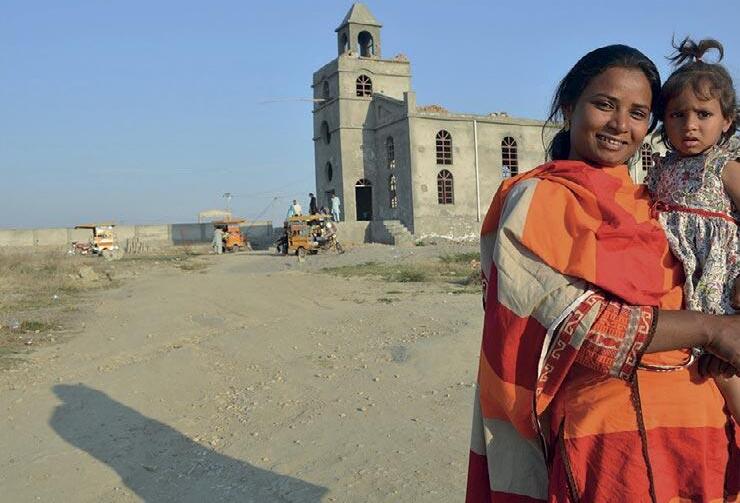
8 minute read
Bishop encounters vibrant Catholic Church in Pakistan punching above its weight
At the Blessed Edward Bamber Catholic Multi Academy Trust, our mission is for all of our Catholic schools to work together to:
Develop excellence by providing the best possible opportunities for every child through consistently delivering a high-quality education.
Build strong communities by providing a support and service to our families, parishes and wider communities, with an unrelenting focus on those most disadvantaged and vulnerable in our society.
With Gospel values at the heart of all we do we will invest in the ongoing professional training and development for the whole Trust community, with Christ as the centre.
We teach our children and young people to ‘belong, engage and become’ so that they reach their full potential and we celebrate their unique talents and their achievements.
We do this by never losing sight of our core values of Trust, Respect, Faith, Hope, Service
Come and join us:
If you have a child ready to start school or Nursery in September, come and be part of our family!
We have a few spaces left in the following schools:
Reception class: Nursery class:
Sacred Heart Christ the King Catholic Academy
St. Mary’s Catholic Primary School (2,3, 4 year olds)
Great Eccleston St. Cuthbert’s Catholic Academy
St. Teresa’s Catholic Primary School (2,3, 4 year olds)
St. Wulstan & St. Edmund’s Catholic St. Teresa’s Catholic Primary School Academy (3-4 year olds) St. Wulstan & St. Edmund’s Catholic Academy (3-4 year olds)
Bishop Tom Neylon made the visit to Pakistan in his capacity as Lead Bishop for Asia for the Catholic Bishops’ Conference of England and Wales at the invitation of Aid to the Church in Need who organised the visit. ACN UK’s website can be found at: acnuk.org
Visiting from 9-16 March, Bishop Neylon visited a number of projects funded by the charity and met with the faithful, priests and bishops in the major cities of Rawalpindi, Islamabad, Lahore and Faisalabad.
Making reference to the fact that Church attendance in Pakistan is very strong, Bishop Neylon received a warm welcome and explained how, at one Friday afternoon Mass in Rawalpindi, there were over 1,000 worshipers in the cathedral with many more outside unable to get in.
“The Church is very strong. It’s very much a minority – between one and two percent of the population would be Christian/Catholic and there are other minority faiths and religions in the country as well. Even though there are a small number of Catholics, in terms of the attendance at church – the place was full…
“The evidence we saw, without any kind of prodding or probing, was the number of people who would turn up for prayer or for Mass – there’s something like a 70% practice rate among the local Catholic population. So, given the environment in which they live, where there can be discrimination of minorities, and welldocumented cases where there’s been violence or even killings associated with places of worship, people make a deliberate choice to say, ‘yes, I want to live my faith. I want to practise my faith. I want to share my faith with my children.’”
Speaking on our Catholic News podcast strand, Bishop Neylon discusses how education is a key priority in the dioceses he visited.
“The education for young people, for young adults as well, [is very important] to try and lift them out of poverty, to seek quali昀cations to get them into the civil service, so they’re able then to join the wider community in serving Pakistan’s society through the civil service network.” He also praised the Catholic Church for delivering education and healthcare services that provide for wider society and not just their own community.
“We heard stories that there are Catholic schools and Catholic hospitals, but they serve the wider community as well. They’re not just in an enclave or a ghetto, but they’re there really to serve the wider society. I think in terms of education, there’s something like 300 Catholic schools across the whole of Pakistan, and very often some of the schools are well subscribed by people not of Christian or Catholic faith, but the majority of people in the population.” CBEW


St Anthony’s Drive, Fulwood, Preston, Lancashire PR2 3SQ
Headteacher: Mr Charnock
Tel: 01772 326900
Email: admin@olchs.lancs.sch.uk
Web: http://www.olchs.lancs.sch.uk
Teacher Training with the Catholic Teaching Alliance
The Catholic Teaching Alliance (CTA) is a partnership between 70 Catholic primary and secondary schools, and a post-16 college, led by Our Lady's Catholic High School with a shared vision and commitment to providing PGCE with QTS (Qualified Teacher Status) courses in partnership with the University of Cumbria.
Contact: 01772 326931
Email: CTAschooldirect@olchs.lancs.sch.uk
Website: www.catholic-teaching-alliance.org
Tel: 01228 210903 Email: jacky.kennedy@mater-christi.com
Chief Executive Officer : Miss Jacky Kennedy
We are very pleased that our family of schools is growing. Our Trust is now 13 schools, 11 Primaries and 2 Secondaries across North Lancashire and Cumbria.


When I was 昀rst ordained priest in 1990, I was appointed to St Joseph’s parish in Preston. Amongst other things we had a thriving parish club. In the summer of 1991 then parish priest, Mgr. Paddy O’Dea took his usual summer holiday trip to Limerick. Before he left, he told me that the bishop would soon move him to another parish, but couldn’t say where, or who would replace him. A week of so later I was in the parish club, and a parishioner came up to me to and said that he thought that the new parish priest was an excellent choice and asked whether I thought so too. I confessed that I didn’t know, and a bit like the story of the journey to Emmaus, it was as if I was the only person in Jerusalem who hadn’t heard of the happenings of the last three days. And thus, I found out that Frank would be my new PP.
Now, one of Saint Joseph’s club’s claims to fame was that it was one of only a small number of Catholic clubs in the Preston area which had the luxury of possessing its own bowling green. For some reason unbeknown to most of us, the bowling season always opened on Good Friday, and Father Frank decided it was time to tackle this issue head-on and so went to a club committee meeting where he challenged the practice, pointing out that, given its solemnity, Good Friday was perhaps not the most appropriate day to begin the bowling season and to be swigging beer. He suggested that it could quite easily be accommodated by moving it one day either way.
However, the committee had been forewarned and had prepared their counter argument. No sooner had Frank 昀nished, than they retorted back “but Father you know it’s called Good Friday - it’s not a day to be miserable and sad; this is a day when we should be rejoicing and being happy at what Jesus did for us.” The matter was eventually resolved in Frank’s favour, and the bowls were rolled away on Holy Saturday morning.
In a sense however the committee were right. The Easter story is good news, not just for us but for the whole of humanity past present and future. It is also intrinsically linked to the priesthoodspeci昀cally to the one priesthood of Jesus
Christ which is shared with those people we call ministerial ordained priests.
A week or so ago, many of us gathered around our Bishop for the Chrism Mass. Not only are the holy oils for the coming year blessed, but the priests also renew their promises. During his homily the bishop reminded us that the renewal of those promises and the easter triduum services are linked.
He said “The obvious 昀rst image for us to note is that this evening, at the Mass of the Lord’s Supper, Our Blessed Lord instituted the Sacred Priesthood. It is the anniversary therefore of our ordination as His priests. The striking posture we adopted on the day of our ordination - our prostration - will be repeated tomorrow afternoon at the beginning of the celebration of the Lord’s Passion.”
And of course, at that Passion, we honour and recall the sacri昀cial death of Jesus on the Cross for the sins of the world, including our own. The Lord who the night before took bread and said, “This is my body which will be given up for you”, now freely and literally gives that body for us. If anyone asks what the job of a priest is, the most obvious answer is to say Mass. We might put that a slightly di昀erent way and say that the job of the priest is to do just what Jesus told us to do; remembering that as part of the words of consecration over the chalice, six 昀nal words are included – “Do this in memory of me.” And that of course is what the Church has faithfully done across the world and across the last 2000 years, and also what Father Frank has done for nearly 58 years since his ordination on 12th June 1965. He has lived out his priesthood for a long time. In fact, he was ordained before I was born – just saying.
Looking at the words of today’s gospel reading, should perhaps recognise the signi昀cance of these words of Peter in the opening lines of the gospel “I am going 昀shing.” This isn’t the desire of a man wanting to pass a bit of time pursuing his hobby, but perhaps rather someone going back to what he is familiar with –turning the clock back, if you like. Once again, we 昀nd ourselves listening to a story that occurs in the period between the resurrection of Jesus and the explosion of the Church onto the streets at Pentecost. These were probably very strange days, with the apostles not quite knowing what to do or even what was happening next.
These must also have been days of uncertainty. The apostles did know and accept the truth that Jesus was risen – they had seen him- but somehow, they failed to fully assimilate this or understand its real signi昀cance – this would take time.
We have the bene昀t of 20:20 hindsight and years of Church tradition; we should not, therefore, perhaps expect everything to haven fallen into place straightaway for the apostles.
And there is perhaps a lesson for us here also. The apostles didn’t really fully understand the resurrection and perhaps nor do we. As the meaning of what had happened eventually sank in, the resurrection was to completely transform the lives and outlook of the apostles, who then went to the ends of the earth to proclaim the good news. Peter could have gone back to the 昀shing, to what he knew and was familiar with and what would earn him his daily bread, but he didn’t; and I suppose the question to us is are we willing to let the power of the resurrection transform our outlook and our lives as we celebrate it during this Easter season?
If the reading had moved on a few more verses, we would have heard the threefold question of Jesus to Peter, “Do you love me?” and the associated “Feed my sheep.” What I think is important here during this encounter is the subtle shift that occurs in the focus on ‘昀sherman’ to ‘shepherd’. Jesus has already told some of his disciples that they will become 昀shers-of-men; he has also told them that he is the Good Shepherd. What happens now with the command “Feed my sheep” is that mantle of good shepherd is also transferred to the disciples also so that they are both 昀shers-of-men and shepherds.
The good shepherd cares for his sheep. A 昀sherman goes out to get a catch. These two roles, equal in weight represent two









